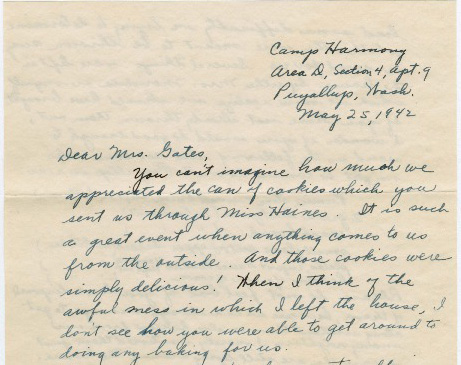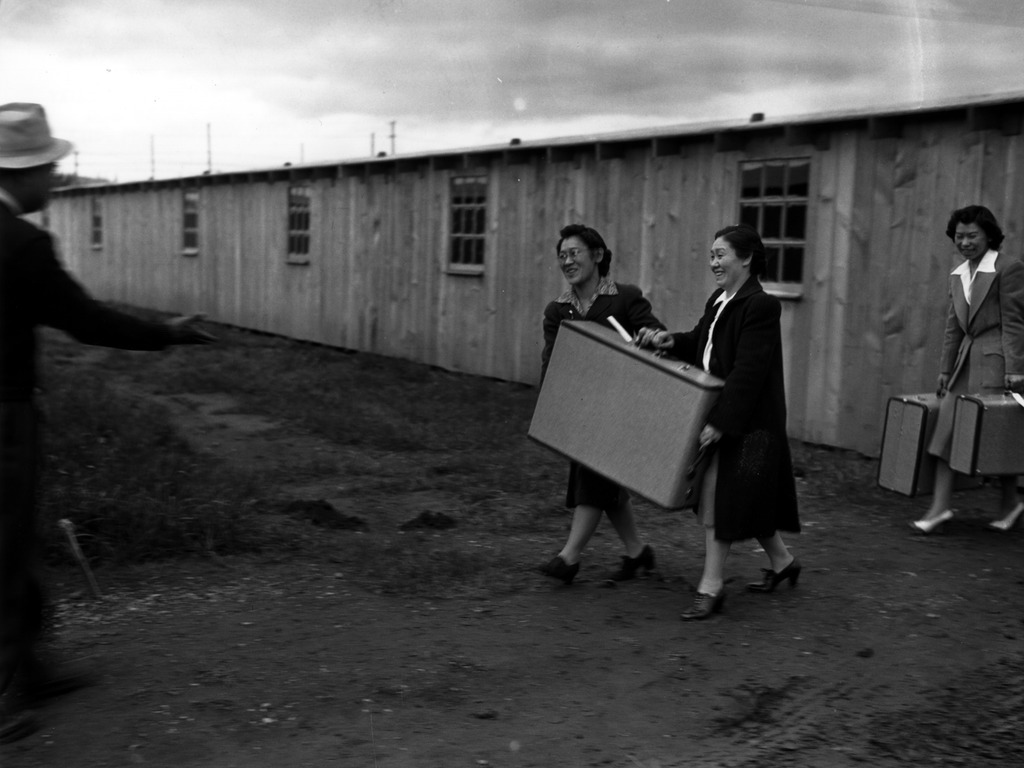March 4, 2016
Densho photo and document collections manager Caitlyn Oiye Coon selected a collection of those letters for inclusion in our month-long celebration of Women’s History Month. She describes the collection, saying: “The Gates Family Collection, which contains letters from the Morishita and Masuda families to Mrs. Charles Gates, shows the types of relationships that could form between the Japanese American community and their neighbors before and after mass removal to the incarceration camps. This collection highlights friendship between neighbors while giving a glimpse into the the upheaval, daily hardships, and small comforts experienced by those incarcerated in the detention facilities and concentration camps.”
One of the letter-writers, Kikuye Masuda, underscored the value of this friendship in a holiday letter to Mrs. Charles Gates, sent from Arizona’s Poston concentration camp:
“The year just drawing to a close has been a most trying one for us, but our spirits have been sustained by the kindness and understanding of friends like yourselves. If only the world had more people like you and others whom it has been our privilege to know, then we could have ‘Peace on earth, good will towards men.'”
We’ve printed another one of Masuda’s letters to Mrs. Charles Gates in full here. Written shortly after being forced to give up her Seattle home and while living in temporary housing in the Puyallup detention facility, the letter shows her grappling with the loss of the comforts of home and struggling to create a sense of normalcy at “Camp Harmony” (a euphemism for the detention facility coined by army public relations officials).

Letter from Kikuye Matsuda to Mrs. Charles Gates
Camp Harmony
Area D, Section 4, Apt. 9
Puyallup, Wash.
May 25, 1942
Dear Mrs. Gates,
You can’t imagine how much we appreciated the can of cookies which you sent us through Miss Haines. It is such a great event when anything comes to us from the outside. And those cookies were simply delicious! When I think of the awful mess in which I left the house, I don’t see how you were able to get around to doing any baking for us.
Thank you, too, for your trouble in forwarding the two boxes of canned goods and for your very nice letter. We were so happy to hear the good news of the expected arrival of “Little Junior Gates.”
Though your letter did make us quite nostalgic, it is a source of great consolation and satisfaction to us to know that good friends of ours are occupying and enjoying our home while we are away. I’m so sorry I was not able to give the house a thorough cleaning before I left. We left so many odds and ends lying around the house that you must have had some difficulty in trying to determine whether they were meant to be thrown away or saved for us. Several things were left in the house by either Mrs. Morishita or myself which we now realize we should have brought. If you have not already thrown them out, I wonder if you would be good enough to send us the following with someone who might be coming down to Puyallup in a car:
Pumice stone & small brush (left in bathroom)
2 green dust pans (in basement)
wash board (” “)
small glass salt & pepper shakers (in kitchen)
plates, cups & sauce dishes if any were left out (” “)
Remains of a can of cocoa (” “)
Please do not feel bad if you have disposed of them, because we can always manage to get along without them or else borrow from our many neighbors. I merely mentioned them just in case they are still lying around the house. I believe Miss Haines or Miss Shipley from Friends’ Center will be coming down this way occasionally.
As for life in camp here, we are gradually getting accustomed to the routine. Area D, being the last to be occupied, is still woefully lacking in necessary facilities. Laundry and shower facilities are very inadequate, and for more than 2700 people there is only one kitchen and mess hall. A shortage in dishes makes it necessary for the group to be served in five shifts with long waiting (sometimes more than an hour) in the “breadline.” The food, however, is as good as one can expect.
Camp Harmony is divided into four distinct areas, with no inter-area visiting allowed except for the privileged few whose staff activities entitle them to special permits. The medical center is not yet equipped for hospital care so patients needing hospitalization are sent to the Pierce County Hospital, but cannot be accompanied by anyone. I’m afraid that by the time improvements are finally made we’ll have to start moving to other relocation areas. One group is leaving tomorrow for the Tulelake Relocation Area in northern California.
I miss the peace and quiet and privacy of one’s own home. Here each family unit is separated from neighbors on both sides by partitions that do not reach the ceiling. We realize that this is supposed to be only a temporary arrangement and so the people here are trying to make the best of the situation. Out of this experience will come a deeper appreciation of so many things which we formerly took for granted. I shall try to keep you informed about ourselves from time to time and I hope you will let us know how you are getting along.
Thank you again for all your kindness.
Sincerely,
Kikuye Masuda
—
See more letters in the Gates Family Collection here.
See “Why do historians value letters and diaries?” for more information and resources related to using letters as historical evidence.
[Photo header: Nisei women arrive at Washington’s Camp Harmony/Puyallup Assembly Center. Photo courtesy of the Museum of History and Industry (MOHAI) http://ddr.densho.org/ddr/densho/36/33/]
